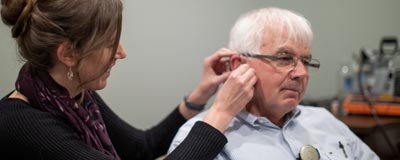What is Speech Reading?
Most people with hearing loss use visual cues to help them understand the speech. Some individuals have a natural ability to speech read, others without appropriate training often struggle with speech comprehension or rely solely on their communication partner speaking loudly or through repetition. Relying on the latter can become quite frustrating and strain interpersonal relationships. Furthermore, this can lead to an overall avoidance to conversation and social interaction if the individual with the hearing loss experiences frustration by their inability to hear. Speech reading is an excellent tool used in conjunction with amplification to improve interpersonal and social relationships.
For the lighthearted, speech reading can be quite fun to learn as well. If you’ve ever had the pleasure of watching a bad speech reading video, they can be quite comical, but they also show the importance of enunciation, facial expressions, and context! Speech Reading involves:
- Watching the lip, jaw, tongue and teeth movements of the speaker
- Facial expressions, gestures, postures and movements which help convey the speaker’s meaning
- Knowing the topic and context
- Good vision – With normal vision, it is possible to speech read up to twenty-four feet but five feet is the ideal distance from the speaker(s)
- Emotional resilience to stay confident and committed to good communication
History
Speech reading, formerly known as lip reading has been used for hundreds of years. In the early 1800’s it was one of the few education options available for individuals who were deaf, and there chance at assimilation in society. Alexander Graham Bell and his father were famous for their speech reading schools. His mother Eliza Grace Symonds and wife Mabel Hubbard were both deaf.
Bell focused his early years teaching hearing-impaired children. In addition, this method of teaching speech reading was thought to be innovative and provided great results for children in the deaf community. After emigrating from England to North America, Bell began to teach speech to deaf students using a universal alphabet invented by his father called “Visible Speech.” Bell, his father and his grandfather were all experts on the mechanics of voice and elocution. Bell once said, “To ask the value of speech is like asking the value of life.”
Speech Reading Success
Speech reading has been proven to have success. After World War I and II, there was a surge in severe to profound hearing loss in Veterans. For that reason, Veterans affairs hospitals were erected and a large part of the rehabilitation provided was concerned with Audiology and hearing rehabilitation. Rehabilitation consisted of an aural rehabilitation program that focused on speech reading, the use of hearing aids, and communication methods. A veteran and now Audiologist Mark Ross can say with the utmost confidence that,
“people with hearing loss can benefit from information about various kinds of communication and repair strategies that can be used to enhance interpersonal communication. With a little practice and focus on the lips, hearing-impaired people can improve their comprehension of the spoken word. (Ross, M, 2001)”
– Mark Ross, PhD, AuD.
Benefits of Learning to Speech Read
There are numerous benefits of learning to speech read which include the following:
- Become a better communicator!
- Increased understanding of hearing loss issues.
- Help hearing aids and other technology do their job.
- Develop a range of troubleshooting strategies to deal with challenging situations.
- Share ideas with other people who have hearing loss.
If you are interested in improving your speech reading skills there are several courses available in the Ottawa area.
Canadian Hearing Society
1620 Scott St, Suite 13, Ottawa, ON
1-866-518-0000
TTY: 1-877-215-9530
email:info@chs.ca
English, French, ASL, LSQ
One on one, or classes/workshops
La Ressource
819-777-3293
Canadian Hard of Hearing Association
75 Albert St, Suite 901
Ottawa, Ontario
K1P 5E7
Voice: 613-526-1584
TTY: 613-526-2692
Fax: 613-526-4718
Toll-Free: 1-800-263-8068 (In Canada Only)
E-mail: chhanational@chha.ca
References:
Alexander Graham Bell. (2017). Retrieved from https://agbfoundation.ca/alexander-graham-bell/
Ross, M. (2001). Aural Rehabilitation: Some Personal & Professional Reflections. http://hearingreview.com/2001/09/aural-rehabilitation-some-personal-amp-professional-relections/






